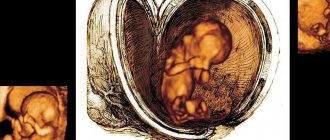According to established medical practice, the gynecologist determines the timing of pregnancy based on the first day of your last menstruation. According to this approach, the second week of pregnancy is a time of preparation for possible fertilization. By the end of the week, the egg is fully matured, so now is the easiest time to get pregnant.
If you follow the embryonic method, when the count is made from ovulation, then pregnancy 2 weeks after conception is the period when the fertilized egg has already attached to the wall of the uterus, that is, implantation has occurred.
What happens to the expectant mother
During the period of ovulation, a woman usually does not experience discomfort: menstrual pain and malaise have passed. But 2 weeks after conception, unusual sensations may occur:
- the breast becomes engorged, the sensitivity of the nipples increases;
- there is discomfort in the lower abdomen;
- may cause nausea, loss of appetite;
- irritability and mood swings occur;
- unusual reactions to familiar odors appear.
Such early signs of pregnancy in the 2nd week after conception and everything that a woman feels now is due to an increase in hCG levels. Its norm in the second week ranges from 50 to 500 mU/ml. Against this background, the pressure drops and you want to go to the toilet more often.
Discharge during ovulation
Mucous
There is even a special term to characterize the discharge during ovulation - “egg white”. This is exactly what they look like - viscous, transparent and plentiful. When such discharge appears, a woman can understand that today is a favorable day for conception. However, at 2 weeks of pregnancy, the discharge will look a little different. Normally, they should be sparse, colorless and without a pungent odor. If a cheesy consistency is observed, this may indicate the presence of thrush in the pregnant woman. The best solution would be to see a doctor and start treatment, preferably at the same time as your sexual partner.
Bloody
Scanty bleeding may indicate the successful attachment of a fertilized egg to the wall of a woman’s uterus. Implantation bleeding is a normal physiological phenomenon that should not cause concern. Quite often it is mistaken for the beginning of the menstrual cycle. However, it is worth understanding that, unlike menstruation, discharge during implantation is light and spotting.
Bleeding
Bleeding during this period is caused by various reasons. This could be delayed menstruation or a symptom of some gynecological disease. If there is blood from the vagina, malaise and pain in the lower abdomen, you should urgently consult a doctor. Timely medical care can relieve the inflammatory process and not delay pregnancy planning.
Stomach ache
Minor pulling sensations in the uterine area should not bother the woman much. However, if abdominal pain intensifies at 2 weeks of pregnancy, this may be an alarming sign of a threatened miscarriage. You need to immediately contact a gynecologist, get the necessary recommendations from him and protect yourself as much as possible from nervous shock.
What happens to the embryo at 2 weeks
A child at 2 weeks of pregnancy is not yet a fetus, but only one small cell that has just attached to the endometrium and is beginning to rapidly grow and divide. A genome is formed inside it - biological information that will determine the external image and developmental characteristics of the unborn child.
If a malfunction occurs and the set of chromosomes turns out to be incorrect, the zygote will not be able to attach to the wall of the uterus and will leave the body along with uterine bleeding. This will be a normal menstruation for you, but this is how the natural mechanism of selecting viable cells works.
Let us repeat that all this applies to the embryonic method of calculating gestational age.
Fertilization
After the end of the ovulatory cycle, the egg enters the fallopian tube, where fertilization occurs. The sperm penetrates inside, triggering a mechanism for changing the structure of the egg and the birth of a new life. These changes prevent the penetration of other male reproductive cells. The fertilized egg enters the uterine cavity and attaches to its wall.
Meanwhile, the woman’s body creates all the conditions for the favorable development of pregnancy. The corpus luteum, formed at the site of the dominant ovarian follicle, begins intensive production of progesterone. This hormone affects the growth of the endometrium of the uterus, ensuring the unhindered process of implantation of a fertilized egg. In addition, it helps maintain a slightly elevated woman’s body temperature – ideal for the fetus.
You should know that the lifespan of a sperm varies from 3 to 4 days, while the egg lives only 24 hours.
Thus, the most favorable period for conception is the day of ovulation itself and a few days before that.
Tests and ultrasound
There are no mandatory pregnancy tests in the second week. You need to wait 3-4 weeks before registration and a comprehensive examination. If the expectant mother wants to make sure her assumptions about pregnancy are correct, she can undergo testing using a pharmacy test or donate blood for hCG in the laboratory. The latter method, of course, is more accurate at such an early stage.
During an examination, an experienced gynecologist can assume the presence of pregnancy by assessing the slightly increased size of the uterus.
Is an ultrasound necessary?
If a woman is preparing to become a mother and is in the 2nd obstetric week of pregnancy, then with the help of ultrasound it is possible to determine the exact timing of ovulation, and therefore the optimal time for conception. Typically, such a study is resorted to for long-term reproductive problems.
At the 2nd embryonic week, ultrasound is not yet informative. The size of the fertilized egg is so small that an ultrasound cannot see what the embryo looks like. You will only notice a dark dot in the photo.
Basic rules for this period:
- Don't restrict yourself in food;
- Don't go on diets;
- There should be at least three meals a day (you can eat five times, but in smaller portions);
- Preference should be given to hearty food so that between meals there is no feeling of hunger.
Some foods are considered potentially dangerous, so it is better to exclude them from the earliest possible date. These include:
- Undercooked, undercooked and dried meat - it can retain viable worm larvae;
- Raw seafood. Lovers of sushi and other exotic dishes risk getting food poisoning or becoming infected with helminths;
- Fast food. This food is harmful in itself, and moreover, it is very often prepared in unsanitary conditions;
- Raw eggs. There is a risk of getting salmonellosis;
- Raw milk. From it you can become infected with brucellosis, tuberculosis, salmonellosis, leptospirosis, Staphylococcus aureus and other infections;
- Soft varieties of cheese. Sometimes they are the source of an acute infectious disease - listeriosis. If you are a big fan of this cheese, use it after heat treatment (for example, bake it in some dishes);
- Liver pates in large quantities. Frequent use of this product can lead to an excess of vitamin A in the body, which is dangerous for a pregnant woman;
- Products that contain caffeine (strong black and green tea, coffee). If you drink more than five cups of these drinks a day, you risk premature birth, miscarriage, or low birth weight of the baby. The best option is no more than three cups per day.
Problems
About 40% of early pregnancies end in miscarriage. In half the cases, the woman is not even aware of what has happened: menstruation may be delayed for a couple of days, and then bleeding will begin, perhaps more profusely than usual.
Another common complication is the threat of miscarriage. It can be suspected by sharp or nagging pain in the lower abdomen and bleeding. Some women note that they bleed a little, while others experience heavy blood loss. The condition is also accompanied by general malaise, dizziness and weakness.
A common cause of this is progesterone deficiency. But with timely consultation with a doctor, pregnancy can be maintained with the help of hormonal therapy.
Ovulation and pregnancy calendar
To calculate the period of readiness of a female egg for fertilization, the principle of diagnosing pregnancy is used. On the test, upon contact with urine, 2 transverse lines are visible, the second of which indicates the body’s readiness to conceive a new life. If for several months it remains paler than the control, you should consult a doctor because of the suspicion of the presence of a pathology in the body, which may be:
- Polycystic ovary syndrome.
- Infantilism.
- Obesity.
- Severe stress.
- Inflammation of the thyroid gland.
Do's and Don'ts
Paying close attention to yourself and your body’s needs will allow you to safely carry your baby without complications. Obviously, during pregnancy it is worth giving up smoking and alcohol, heavy physical and thermal stress, which increase uterine tone and lead to miscarriage. Avoid stressful situations. Taking any medications without a doctor's prescription can be dangerous for the unborn child. Be sure to tell the prescriber about your situation.
An expectant mother can and should eat a balanced diet, maintain physical activity, get enough sleep and proper rest, remain calm and have a positive attitude in any situation.
How to increase your chances of conceiving
If you are in your second obstetric week, follow a number of rules of intimate life that will help you get pregnant faster. A few days before expected ovulation, avoid physical intimacy to preserve and maintain sperm quality and motility.
After sexual intercourse, do not rush to get up: lie down for about 20 minutes, perhaps raising your legs or placing a pillow under your buttocks. This will help the sperm reach their goal faster.
And the most important condition is to get rid of internal worries, because the factor of psychological infertility occurs in 10% of cases. You will succeed!
Immunity squared
A fertilized egg is the result of the fusion of two germ cells (from mom and dad), so the female body perceives the male “half” as a foreign body. The immune mechanisms that guard the safety of our health would simply be obliged to expel the “stranger.” But smart nature took care of this too. According to the latest data from scientists, several protein molecules, including EPF, become immunosuppressants during pregnancy, suppressing the mother’s immunity to the child. Such protection begins to develop progressively almost immediately from the moment of conception. After implantation, a truce occurs for a long time between father’s and mother’s antibodies.
An interesting picture emerges: a woman’s immunity decreases only in relation to the fetus, gradually ceasing to perceive it as something foreign (until the child’s intrauterine development is completed and he is ready for birth). At the same time, the expectant mother’s immunity to external factors increases. However, viruses and internal infections that are not treated before pregnancy can still be dangerous to the fetus.
Of course, the mechanisms for protecting women and children are much more complex. Some failures in them can even lead to miscarriage - premature spontaneous termination of pregnancy. For example, when a woman develops antibodies to hCG. But the more reasons scientists uncover for such problems, the faster they find ways to solve them.
Checklist 2 weeks pregnant
- Stock up on ovulation and pregnancy tests.
- 2 weeks after conception, undergo a blood test for hCG to be completely sure of the changes that have occurred.
- Change your lifestyle for the better: watch your diet, walk more, maintain a sleep-wake schedule.
- Remember to take 400 mcg of folic acid, unless otherwise prescribed by a specialist.
It doesn't matter how you count the weeks of pregnancy. Family planning and preparation for pregnancy require careful attention and a competent approach. The Women's Medical Center is pleased to offer you individual pregnancy planning and management programs at affordable prices.
First signs of pregnancy
- If you carefully monitor your feelings, then the very first sign of pregnancy can be felt long before the next menstruation is missed. About a week after fertilization, the embryo has already moved from the fallopian tube into the uterine cavity, where it is implanted - attached to the endometrium. It is at this time that a woman may feel slight pain in the abdomen, and there may also be light bloody or brown discharge at 2-3 weeks of pregnancy.
- Already from the moment of fertilization, that is, from the end of the 2nd week of pregnancy, a woman can feel changes in her well-being. After all, a global restructuring of her body is now taking place, allowing her to bear the baby. Hormonal levels change significantly, and it is very difficult not to notice. Mood swings, changes in discharge from the 2nd week of pregnancy, a slight increase in body temperature, mild nausea, weakness - this is how progesterone manifests itself.
- Change in taste preferences. This common symptom of early pregnancy is sometimes not noticed by women. Most often, a craving for salty foods arises, and the expectant mother unknowingly begins to add salt to the dishes. But dad will notice it right away. In addition, half a jar of pickles for dinner is also hard to miss.
- Changes in the mammary glands. Already from the first days after conception, under the influence of hormones, changes occur that women immediately notice: the mammary glands become somewhat enlarged, become painful, and a distinct venous network appears.
- Delayed menstruation. Even having noticed all the symptoms described above, most women wait for this particular sign. After all, it is the most specific. During the development of pregnancy, a high concentration of progesterone prevents the next rejection of the surface layer of the endometrium, because the embryo has already been implanted into it. But this sign of pregnancy does not always happen. In some cases, even during pregnancy, there may be monthly bleeding, especially in the early stages.
- Positive pregnancy test. Modern test strips allow you to determine pregnancy from the first days of your delay. The test is based on determining the content of human chorionic gonadotropin in the urine. A negative test result does not indicate the absence of pregnancy - it is only a sign that the level of hCG in the sample of urine being tested is lower than the test strip can detect. If you are planning a pregnancy, and the test shows a negative result, redo it in a couple of days, purchase a highly sensitive test system. And if the result is positive, feel free to go to the doctor to confirm your pregnancy! You should be aware that a positive test result is also not always accurate, since hCG can be present in high concentrations in some hormone-producing diseases.
How many days after conception do real pregnancy symptoms appear?
The first real signs of pregnancy appear after the embryo implants into the endometrium of the uterus. Until then, all symptoms are subjective.
The first days after fertilization are not accompanied by specific clinical manifestations.
The severity of symptoms will increase as the embryo grows. Experts note that at 5-6 weeks of gestation, a woman can determine the presence of pregnancy without a test by the corresponding symptoms.
attitude to alcohol
Drinking alcohol to stimulate mood and relieve nervous tension can lead to dire consequences. Alcohol does not always interfere with the process of egg formation, but its effect is difficult to calculate and can cause irreparable harm to the unborn child. Even low-alcohol drinks should not be consumed during pregnancy and planning.
In France, children born with congenital deformities and mental pathologies in the last century were called “children of Sunday,” that is, the fruits of a drunken conception. In the USSR of the 60-70s, when abortion was not welcomed at the state level, to carry it out it was enough to say that pregnancy was the result of conception while intoxicated.
When will I ovulate?
The duration of the menstrual cycle for most women is 28–32 days, although a couple of days plus or minus is also normal. Ovulation occurs approximately 14 days after the first day of the last menstrual period. For women whose cycles are shorter or longer than the standard 28 days, the day of ovulation may shift earlier or later.
Nutrition for the expectant mother
Since the expectant mother is now responsible not only for herself, but also for her child, she needs to take responsibility for compiling her diet. The daily diet of the expectant mother should include:
- Vegetables and fruits. There will be more benefits from fresh vegetables and fruits than from dried, dried or canned ones. Therefore, it is better to eat fresh vegetables (cabbage, carrots, zucchini) and fruits (bananas, pears, apples).
- Meat and fish. Of the meats, poultry meat will be the most useful, as it is a lean meat. Fish that a pregnant woman can eat include salmon, cod, and tuna.
- Dairy products. There are practically no restrictions on the consumption of dairy products: yoghurt, fermented baked milk, kefir, various types of cheese, cottage cheese.
- Legumes: beans, peas, lentils.
As for the method of cooking, the most suitable option is steamed dishes. It is better to minimize the consumption of fried and smoked foods. The same applies to overly spicy and sweet dishes.
You should limit your intake of tea and coffee - the consumption of these drinks will interfere with the proper absorption of iron from food, which is fraught with consequences in the idea of anemia (anemia). It is enough to drink tea once a day, no earlier than 2.5 hours after eating. Natural juices, compotes, and jelly will be useful.
In addition to the vitamins obtained from the food consumed, a pregnant woman needs to take additional vitamins purchased at the pharmacy. As a rule, a woman cannot independently determine what vitamins her body needs. Therefore, all vitamin preparations should be taken only as prescribed by a doctor. For example, a doctor may prescribe folic acid or antioxidants, which will have a strengthening effect on the body of a pregnant woman and will help reduce the risk of the baby developing hereditary diseases.
Contrary to prevailing public opinion, a pregnant woman should be very responsible about her diet, and not eat everything in a row and in unlimited quantities. If the expectant mother is overweight, this can lead to health problems not only for her, but also for the baby, and there is also a risk that the birth will be difficult.
Planning a pregnancy is a very serious stage in the life of spouses, requiring great responsibility and the awareness that their behavior will determine how healthy the long-awaited baby will be born. The more a mother takes care of her health in the second week of pregnancy, the easier the pregnancy will be and the easier the birth process itself will be!










